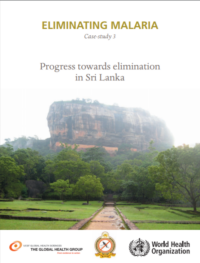Eliminating Malaria (case study 3): Progress towards elimination in Sri Lanka
Collaborator(s): University of California San Francisco (UCSF), United States
Countries: Sri Lanka
Published: 01/10/2012
The WHO Global Malaria Programme and the Global Health Group at the University of California in San Francisco, supported by the Bill and Melinda Gates Foundation, launched a new series of case-studies on malaria elimination: Eliminating malaria. In this series, national malaria control programmes and researchers generate new evidence about what works – and what does not – for reaching and sustaining zero malaria transmission.
The objective of this work is to build an evidence base to support intensification of malaria elimination as an important step in achieving international malaria targets. Ten case-studies were prepared and all together provide insights into and lessons to be learned from a wide range of elimination approaches and geographical settings.
This report describes the policies and strategies used to control malaria in Sri Lanka from 1970 to 1999 and how malaria has been brought to the brink of elimination from 2000–2011. Lessons for countries that are pursuing or considering malaria elimination are distilled.

